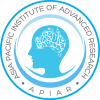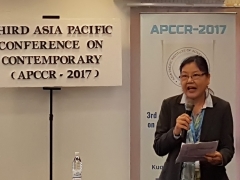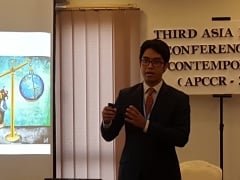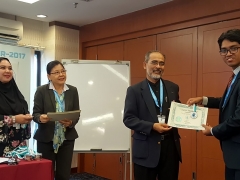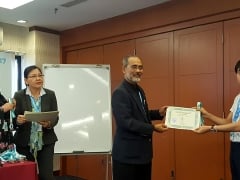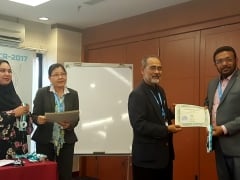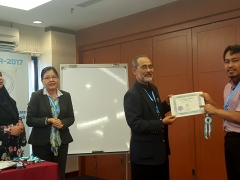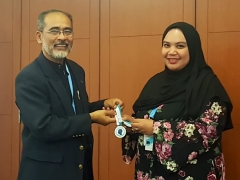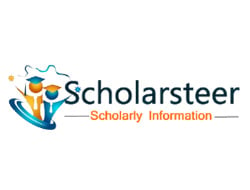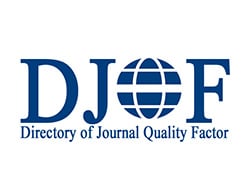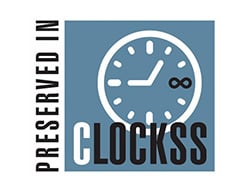3rd Asia Pacific Conference on Contemporary Research (APCCR -2017), Kuala Lumpur, Malaysia
DATE: 2017-08-26 - 2017-08-27
VENUE: Hotel Sentral , Kuala Lumpur, Malaysia
CONFERENCE PROCEEDINGS : APCCR - 2017
FRONT MATTER: APCCR - 2017 (VOLUME 3)
Conference:
Conference: 3rd Asia Pacific Conference on Contemporary Research (APCCR - 2017)
Chief Editor: Professor Mohd. Nazari Ismail
Location: Hotel Sentral, Kuala Lumpur, Malaysia
Date: 26th and 27th of August, 2017
Sponsor: Asia Pacific Institute of Advanced Research (APIAR)
Publisher:
Asia Pacific Institute of Advanced Research (APIAR)
Suite 1A Level 2; 802 Pacific Highway; Gordon NSW 2072; Australia
Document Information:
Document Type: Proceedings Paper
Language: English
ISBN: 978-0-9953980-7-8
Copyright @ 2017, Asia Pacific Institute of Advanced Research (APIAR).
WORK LIFE BALANCE AND INTENTION TO QUIT AMONG FEMALE WORK FORCE
Best Paper in Business.
Author details:
- Ms. Shumaila Atiq, University of Central Punjab, Lahore, Pakistan.
- Dr. Salman Iqbal, University of Central Punjab, Lahore, Pakistan.
- Ms. Mamoona Rasheed, University of Central Punjab, Lahore, Pakistan.
Page Numbers: 31 - 40
DOWNLOADDOES POETRY ENHANCE CRITICAL THINKING SKILLS AMONG UNDERGRADUATES?
Best Paper in Education.
Author details:
- Julie Chuah, Universiti Sains Malaysia, Malaysia.
Page Numbers: 101 - 101
DOWNLOADTHE 3rd GENERATIONS OF BIKESHARING DEVELOPMENT IN INDONESIA
Best Paper in Information Technology.
Author details:
- Weningtyas Widyarini, Institut Teknologi Bandung, Indonesia.
- Wibowo Sony Sulaksono, Institut Teknologi Bandung, Indonesia.
- Hidayat Yan Syafri, Institut Teknologi Bandung, Indonesia.
Page Numbers: 102 - 102
DOWNLOADTRYING TO BUY A NEW PRODUCT: WHAT DOES ADVERTISING DO NOWADAYS?
Best Paper in Social Sciences.
Author details:
- Cynthia Ayu Manggarani, Universitas Gadjah Mada, Yogyakarta, Indonesia.
- Basu Swastha Dharmmesta, Universitas Gadjah Mada, Yogyakarta, Indonesia.
Page Numbers: 122 - 132
DOWNLOADMODERATING EFFECTS OF TECHNOLOGY READINESS ON ATTITUDES AND RESPONSES TO MOBILE CHECK-IN AT SOUTH AFRICAN AIRPORTS
Author details:
- Gregory John, University of the Witwatersrand, Johannesburg, South Africa.
- Sumeshin Naidoo, Former MBA student at Wits Business School, Johannesburg, South Africa.
Page Numbers: 01 - 11
DOWNLOADEMPLOYEES’ ATTITUDE DURING TIMES OF PROPOSED MERGER (A CASE OF TWO BANKS MERGER IN PAKISTAN)
Author details:
- WaqarAkbar ,Shaheed Zulfikar Ali Bhutto Institute of Science and Technology (SZABIST).
- Sana Ejaz, Mohammad Ali Jinnah University (MAJU), Pakistan.
- Sana Riaz, Mohammad Ali Jinnah University (MAJU), Pakistan.
- KashifArif, Mohammad Ali Jinnah University (MAJU), Pakistan.
Page Numbers: 12 - 21
DOWNLOADMEASURING THE NON-FINANCIAL REWARDS IN ESCALATING EMPLOYEES JOB SATISFACTION (A STUDY OF PRIVATE COMPANIES IN PAKISTAN)
Author details:
- Waqar Akbar, Shaheed Zulfikar Ali Bhutto Institute of Science and Technology (SZABIST), Pakistan.
- Sana Riaz, Mohammad Ali Jinnah University (MAJU), Pakistan.
- Kashif Arif, Mohammad Ali Jinnah University (MAJU), Pakistan.
- Ahson Hayat, Tradekey, Karachi, Pakistan.
Page Numbers: 22 - 30
DOWNLOADWORK LIFE BALANCE AND INTENTION TO QUIT AMONG FEMALE WORK FORCE
Best Paper in Business.
Author details:
- Ms. Shumaila Atiq, University of Central Punjab, Lahore, Pakistan.
- Dr. Salman Iqbal, University of Central Punjab, Lahore, Pakistan.
- Ms. Mamoona Rasheed, University of Central Punjab, Lahore, Pakistan.
Page Numbers: 31 - 40
DOWNLOADAN ANALYSIS OF AIRLINE/AIRPORT LOUNGE SERVICE USING DATA GATHERED FROM AIRLINEQUALITY.COM
Author details:
- Bình Nghiêm-Phú, Fukushima National College of Technology, Fukushima, Japan
Page Numbers: 41 - 48
DOWNLOADTHE EFFECT OF USER ACCEPTANCE ON CONTINUANCE INTENTION FOR ONLINE SHOPPING (RESEARCH ON INSTAGRAM USER)
Author details:
- Brian Gregory Adhihendra, Gadjah Mada University, Yogyakarta, Indonesia.
- Sahid Susilo Nugroho, Gadjah Mada University, Yogyakarta, Indonesia.
Page Numbers: 49 - 59
DOWNLOADVOLATILITY OF CHINA SHANGHAI STOCK PRICE-EXCHANGE RATE
Author details:
- Ming Fan, National University of Malaysia, Malaysia.
- Meng meng Dong, Hangzhou Wanxiang Polytechnic, China.
Page Numbers: 60 - 68
DOWNLOADCROWDSOURCING AND SERVICE-DOMINANT LOGIC: THE INTERACTION EFFECT OF BRAND FAMILIARITY, CUSTOMER EXPERIENCE AND LOYALTY ON VALUE CO-CREATION
Author details:
- Cheah Wen Kit, Inceptale Media, Kuala Lumpur, Malaysia.
- Izzal Asnira Zolkepli (Ph.D), Universiti Sains Malaysia, Penang, Malaysia.
Page Numbers: 69 - 77
DOWNLOADDOES THE PREVIOUS CONSUMER TRANSACTION EXPERIENCE STRENGTHEN REPURCHASE INTENTION ON WEBMALL?
Author details:
- Olivia Barcelona Nasution , Gadjah Mada University, Yogyakarta, Indonesia.
- Sahid Susilo Nugroho, Gadjah Mada University, Yogyakarta, Indonesia.
Page Numbers: 78 - 90
DOWNLOADTHE PRICING OF AUDIT SERVICES: EVIDENCE FROM CHINA
Author details:
- Abdul Rahman Al Natour, Nottingham University Business School, Nottingham, UK
- Ja Ryong Kim, Nottingham University Business School, Nottingham, UK.
- Andrew W Stark, Alliance Manchester Business School, Manchester, UK.
Page Numbers: 91 - 91
DOWNLOADTHE RELATIONSHIP BETWEEN DIFFERENT TYPES OF CREDITOR AND SMOOTH EARNINGS AND SMOOTH CASH FLOW: EVIDENT FROM UK PRIVATE FIRMS
Author details:
- Nor Afifah Shabani, Nottingham University Business School, Nottingham, UK.
- Elisabeth Dedman, Nottingham University Business School, Nottingham, UK.
- Ja Ryong Kim, Nottingham University Business School, Nottingham, UK.
Page Numbers: 92 - 92
DOWNLOADSMARTPHONE APPLICATION FOR INCREASING ENGLISH CULINARY VOCABULARY
Author details:
- Aryo Baskoro Utomo, Universitas Negeri Semarang, Indonesia.
- Sita Nurmasitah, Universitas Negeri Semarang, Indonesia.
Page Numbers: 93 - 100
DOWNLOADDOES POETRY ENHANCE CRITICAL THINKING SKILLS AMONG UNDERGRADUATES?
Best Paper in Education.
Author details:
- Julie Chuah, Universiti Sains Malaysia, Malaysia.
Page Numbers: 101 - 101
DOWNLOADTHE 3rd GENERATIONS OF BIKESHARING DEVELOPMENT IN INDONESIA
Best Paper in Information Technology.
Author details:
- Weningtyas Widyarini, Institut Teknologi Bandung, Indonesia.
- Wibowo Sony Sulaksono, Institut Teknologi Bandung, Indonesia.
- Hidayat Yan Syafri, Institut Teknologi Bandung, Indonesia.
Page Numbers: 102 - 102
DOWNLOADHELPING OTHERS THROUGH A VIRTUAL COMMUNITY (Communication Pattern of Smog Problems by Bebas Asap Volunteers)
Author details:
- Ratna Permata Sari, Universitas Islam Indonesia, Yogyakarta, Indonesia.
Page Numbers: 103 - 109
DOWNLOADLANGUAGE MAINTENANCE FACTORS: REFLECTIONS ON THE ARABIC LANGAUGE
Author details:
- Dr. Mostefa Abdelhadi, University of Southern Queensland, Australia.
Page Numbers: 110 - 121
DOWNLOADTRYING TO BUY A NEW PRODUCT: WHAT DOES ADVERTISING DO NOWADAYS?
Best Paper in Social Sciences.
Author details:
- Cynthia Ayu Manggarani, Universitas Gadjah Mada, Yogyakarta, Indonesia.
- Basu Swastha Dharmmesta, Universitas Gadjah Mada, Yogyakarta, Indonesia.
Page Numbers: 122 - 132
DOWNLOADTHE IMPLICATIONS OF DEMOGRAPHIC TRANSITION FOR PRODUCTIVE ABSORPTION OF THE LABOUR FORCE: THE CASE OF BANGLADESH
Author details:
- Md. Zahidur Rahman, Bangladesh University of Professionals (BUP), Dhaka, Bangladesh.
- Rashed Al Mahmud Titumir, University of Dhaka, Bangladesh.
Page Numbers: 133 - 133
DOWNLOADTHE PERCEIVED EFFECTIVE MOTIVATION METHODS IN CHINA’S CREATIVE INDUSTRIES: THE MANAGERIAL PERSPECTIVE
Author details:
- Yuet-Kai Chan, The Hong Kong Polytechnic University, Hong Kong, China.
- Henry Ma, The Hong Kong Polytechnic University, Hong Kong, China.
Page Numbers: 134 - 141
DOWNLOADA PROBE INTO CULTURAL HERITAGE VERSUS MODERN TERRORISM
Author details:
- Hosseini, M, Imam Sadiq University (ISU), Tehran, Iran.
Page Numbers: 142 - 142
DOWNLOADAPCCR - 2017 Info
The 3rd Asia Pacific Conference on Contemporary Research (APCCR -2017) will be held on 26th and 27th of August 2017 in Kuala Lumpur, Malaysia. The main theme of this conference is ‘Sharing Solutions’. The conference will cover every topic from the areas of Business, Education, Social Sciences and ICT. Internationally-recognized scholars will participate in the event to present their latest research and best practices.
We, the conference organisers invite you to participate in this event where you can:
- Strengthen your professional ties: this may lead to publications and job opportunities – an invaluable opportunity for post-PhD professionals.
- Receive feedback and constructive critique on your ideas: benefit from the audience engaging with your content rather than focusing on your punctuation and references.
- Refine your communication skills: move from your “isolating” research experience to a more collaborative and exchange of perspectives.
- Participate in our conference and publish your research directly through the conference proceedings and journals. Don’t miss this great opportunity to get your work out there!
Our conferences are multidisciplinary and focus on different subject areas. Over the past few years an average of forty to fifty participants have participated in each event. Great interaction and professional networking took place on every occasion. You can take advantage of these benefits by participating in a conference that will assist you to enhance your research career.
All submitted papers will be peer reviewed and published in the conference proceeding to promote the prominent (and emerging) voices within your field of research.
Asia Pacific Journal of Advanced Business and Social Studies (APJABSS) (ISSN: 2205-6033)
Asia Pacific Journal of Contemporary Education and Communication Technology (APJCECT) (ISSN: 2205-6191)
– International Journal of Web Based Communities (ISSN: 1741-8216)
– International Journal of Continuing Engineering Education and Life-Long Learning (ISSN: 1741-5055)
All accepted conference articles from the 3rd Asia Pacific Conference on Contemporary Research (APCCR- 2017) will be checked against the rigorous criteria set by these two journals, and articles meeting the requirements will be published in special issues of the journals.
Conference Committee

Prof. Peter Curson

Prof. Kubais S. Abdulfattah Fahady

Dr Ross Yates

Prof. Dennis Rumley

Prof. Maurice Galton

Asst. Prof. Hongjin Zhu

Assoc. Prof. Nourah Alyousef

Professor Ghassan Omet

Professor Robert Wright

Assistant Professor Ahmed Ali Khalifa

Professor Martin Mills

Professor Djamel Eddine Laouisset

Professor Robyn Gillies

Associate Professor Pawel Bilinksi,

Associate Professor Blaine Hatt

Assistant Professor Ali Alkhalifah

Associate Professor Jehad Aldehayyat

Associate Professor Peter Kriesler

Professor Elizabeth Fernandez

En Mohammad Amizi Bin Ayob

Dr Mohd Shukri Hanapi
Call for Paper
The 3rd Asia Pacific Conference on Contemporary Research (APCCR -2017) will be the premier forum for the presentation of new advances and research results in the fields of theoretical, experimental and applied Business, Social Sciences, Information and Communication Technology, and Education. The conference will bring together leading researchers, academics, consultants, scholars, practitioners and research students from their respective domains of interest around the world. Our distinguished participants will have the opportunity to present their valuable research contributions and to establish an international network among those who volunteer to communicate and study together in the fields of knowledge mentioned above. The conference committee strongly encourages postgraduate research students to present their research proposals, literature reviews or findings at this event with a very special registration fees. Other interested parties and delegations from these fields are also free to attend this event.
All submissions will be peer reviewed and evaluated, based on originality, technical and/or research content/depth, accuracy, relevance to the conference and readability. Submissions will be chosen based on technical merit, interest, applicability, and how well they fit into a coherent and balanced technical program.
Topics of interest for submission include, but are not limited to:
Business: Accounting, Strategic Finance, Macroeconomics, Microeconomics, Strategic Management, Strategic Marketing, Leadership, Entrepreneurship, Human Resource Management, Human Resource Development, Performance Management, Recruitment and Selection, Logistics and Supply Chain Management, International Business, Globalisation, Corporate Social Responsibility, E-business/E-commerce, Integrated Marketing Communication and Relationship Marketing.
Social Sciences: Anthropology, Archaeology, Area Studies, Cultural and Ethnic Studies, Communication Studies, Gender and Sexuality studies, Geography, History, Law, Linguistics, Political Science, Psychology, Sociology, International Relations, Development Studies, Population Studies, Journalism and Mass Communication, Corporate Governance, Cross-Cultural Studies, Peace and Conflict Studies, Public Administration, Philosophy, Women’s Studies, Religious Studies and Social Welfare Studies.
Education: Theory of Education, Assertive and Assistive Educational Technology, Comparative Education, Counselling, Cultural Literacy, Curriculum Studies, Distance Education, Early Education, Educational Change, Educational Policy, Planning and Practice, Educational Psychology, Education and Public Policy, Educational Research and Statistics, E-learning, Health Education, Tertiary Education, Innovative Education, Information & Library Science, International Exchange Programs, Language Education, Liberal Education, Mathematics Education, Medical Education, Physical Education, Science Education, Secondary Education, Special Education and Technology Education.
Information and Communication Technology: Advanced IT Bio/Medical Engineering, Bioinformatics and applications, Business and Information Systems, Cloud computing, Convergence in Information Technology Security, Data Mining and Knowledge Discovery, Digital convergence, Electronic Commerce, Business and Management, Grid and Cloud Computing, Intelligent Robotics and Autonomous Agents, Hardware and Software Design, Health and Medical Informatics, Hybrid information technology, Intelligent communications and networks, IT-based Convergence Technology and Service, Multimedia convergence, Smart Card and RFID Technologies, Soft Computing and Intelligent Systems, Social and Business Aspects of Convergence IT, Ubiquitous Computing and Embedded Systems, Recent Trends in Computing & Information technology.
All papers accepted in the APCCR– 2017 will be published in the following online journals without any additional fees:
Asia Pacific Journal of Advanced Business and Social Studies (APJABSS) (ISSN: 2205-6033)
Asia Pacific Journal of Contemporary Education and Communication Technology (APJCECT) (ISSN: 2205-6191)
No manuscript will be accepted without the required format. All manuscripts should be professionally proofread before submission.
Author Guidelines
Papers should be original contributions and should not be under consideration for any other conference or publication at the same time. Full papers must contain the title of the paper, name(s) and affiliation(s) of the author(s), abstract (200–250 words) and keywords (3–5 keywords, organised alphabetically). The main text of the paper must include the introduction, research problem, review of the relevant literature, methods, data analysis and conclusion. The full paper should be a minimum of 6 pages and maximum of 12 pages in length.
The reviewers or the review committee may sometimes request access to data and calculations during the review process. Authors must be willing to supply these if requested. Papers must be in MS Word file format and submitted electronically to the conference chair.
Authors are fully responsible for obtaining permissions and clearing any copyright issues relating to the content of their submissions. Each submission will be reviewed by two anonymous reviewers with sufficient expertise in the relevant field.
For each accepted paper, at least one author must register for the conference as a presenter. The duly registered presenter(s) shall be allowed to present the accepted paper(s) at the conference and shall be included in the conference proceedings published by Asia Pacific Institute of Advanced Research (APIAR). Only the registered presenter(s) can present papers and no substitutes will be allowed. Registered presenters shall receive a copy of the conference proceedings at the conference.
Please click on the following link to download the Full Paper Template.
Important Dates
|
Events |
Dates |
|
Abstract |
30th June 2017 |
|
Early bird registration deadline |
7th July 2017 |
|
Regular registration deadline |
14th July 2017 |
|
Full Paper submission deadline (Optional) |
25th August 2017 |
|
Conference dates |
26th-27th August 2017 |
The organising committee of APCCR- 2017 kindly requests all the authors of the accepted abstracts / papers to register latest by the regular registration deadline, otherwise the accepted papers may not be included in the conference proceedings for APCCR – 2017.
Best Paper Awards
APIAR recognises outstanding contributions to research. There are four Best Papers awards for four streams. Best Papers are judged both on the merits of the written document and on the quality of their presentation at the conference. The awards serve to acknowledge the authors who receive them as leading researchers in Business, Education, ICT and Social Sciences. The awards also provide an incentive to authors to produce high-quality papers and present them in a lucid and compelling manner.
APIAR Best Paper Award recipients are selected through a two-prong process. The first step is a review of the full-length papers accepted for the conference. Review committee members of the conference rank these papers according to quality, relevance and originality, to determine the finalists for each award category. While selection as a finalist for an APIAR Best Paper Award is a notable achievement in itself, winners are then chosen from the finalists, according to the quality of their presentations. Presentation quality is judged according to the audience feedback collected at the conference.
About Kuala Lumpur
Malaysia is Located just north of the equator, Malaysia borders Thailand, Indonesia and Brunei, and has maritime boundaries with Indonesia, Singapore and the Philippines. Malaysia’s population is around 30.573 million in at present. Malaysia is a bubbling, bustling melting pot of races and religions where Malays, Indians, Chinese and many other ethnic groups live together in peace and harmony. Multiculturalism has not only made Malaysia a gastronomical paradise, it has also made Malaysia home to hundreds of colorful festivals. Malaysians love celebrating and socializing; the people are warm and friendly. Kuala Lumpur is the federal capital and most populous city in Malaysia. There are number of frequent flights to and from all major international airports of the world.
Considered the ‘heart and soul’ of Malaysia is the capital city of Kuala Lumpur, fondly referred to as KL by most regular visitors. The city has managed to preserve its rich history, having once been a tin-mining centre in the 1850s. KL aptly fits the title of ‘Malaysia: Truly Asia’ with its Asian cyber city, towering hi-tech buildings, skyscrapers, historic temples and mosques, shopping malls and glitzy hotels. The minute you enter the vivacious city you are greeted with a futuristic vibe, reflecting the economic boom of the sovereign nation-state.
The gleaming Petronas Twin Towers represent the rich culture of Malaysia with its museums, shops and eateries, while the line of stalls offering products of every description from leather, handicrafts, artistry to the customary ‘Dunhill’ watches attract locals and tourists alike looking for worthy bargains. The bustling Chinatown will leave you spoilt for choice with its attractive goods, while the National Museum with its interesting collections and beautiful Batu Caves will give you a glimpse of Kuala Lumpur’s cultural diversity. With all these attractions and many more, Kuala Lumpur is an alluring example of where old meets new, and vintage meets contemporary.
Much like its food, the people lend the city a distinct culture that sets it apart from other Asian cities. Wherever you go, you can hear the breathless chatter of ethnic Malays, Chinese Muslims, Indians and Punjabis. English is widely spoken throughout the city.
Let your hair down at a ritzy lounge, shop all day at one of the magnificent malls or test your bargaining skills at the quaint cluster of makeshift shops in the heart of the city. There is no end to the things you can do here. Climb the giddying heights of the Menara Kuala Lumpur Observation Deck after snacking on some local specialties in Petaling Street. The view encapsulates the feel of one of the greatest cities in Asia, and there is no denying it.
Shopping: From high-end fashion in the cool comfort of modern shopping malls, to the thrill of picking up antiques and curios in local markets, Kuala Lumpur offers a fun-filled shopping experience. Test your bargaining skills at the night markets where you can buy cheap knock-off 'Rollexx Watches' and 'Praada Bags'. The once-a-year Mega Sale Carnival is the icing on the cake, with tempting discounts and promotions to woo shoppers.
Breathtaking Views: Breathe in the surrounding beauty of this futuristic city from the top of the Petronas Twin Towers and Menara Kuala Lumpur Observation Deck.
Food: The choice of cuisines available in Kuala Lumpur speaks volumes about the rich cultural heritage of Malaysia’s capital city. From ubiquitous road-side stalls to fine dining, the city offers Chinese, Indian, Continental, Malaysian and Japanese cuisine.
Rich Cultural Heritage: Kuala Lumpur plays host to colourful festivals and cultural celebrations that flourish all year round. The city’s multi-ethnic population observes their religious, cultural and national celebrations in an atmosphere of mutual respect and tolerance.
Sponsorship
Asia-Pacific Institute of Advanced Research (APIAR) always welcomes any kind of sponsorship. APIAR believes that it is a great opportunity for sponsors to enhance their visibility and to reach academics, researchers, consultants and members of the business community from around the world. In our conference ‘3rd Asia Pacific Conference on Contemporary Research (APCCR -2017)’ we are expecting delegates from around 20 countries. APIAR strongly encourages potential sponsors to participate in APCCR-2017 for the excellent exposure their organisations will receive. The number of contributions necessary to become a sponsor is negotiable.
APIAR offers three different types of sponsoring opportunities as follows:
GOLD Sponsorship
Special Session in Program:
- A 15-minute special session in front of the full audience to explain your organisation’s unique characteristics.
Branding:
- The logo of your organisation will be displayed on all APCCR-2017 websites, newsletters, on the USB of Proceedings and on signage at the venue.
Press Release:
- A press release, announcing your participation, will be sent to all APCCR-2017 media and analyst contacts.
E-Newsletters:
- Presentations will be featured in multiple e-Newsletters distributed to the APIAR Community.
Conference Dinner and Crest:
- Every table will have table signage displaying your organisation’s name. You will also receive a crest from the conference chair.
SILVER Sponsorship
Special Session in Program:
- A 10-minute Technical Partnership presentation focused on corporate technical interests.
Branding:
- The logo of your organisation will be displayed on all APCCR-2017 websites, newsletters, on the USB of Proceedings and on signage at the venue.
Press Release:
- A press release, announcing your participation, will be sent to all APCCR-2017 media and analyst contacts.
Crest:
- You will receive a crest from the conference chair.
BRONZE Sponsorship
Branding:
- The logo of your organisation will be displayed on all APCCR-2017 websites, newsletters, on the USB of Proceedings and on signage at the venue.
Press Release:
- A press release, announcing your participation, will be sent to all APCCR-2017 media and analyst contacts.
E-newsletters:
- Presentations will be featured in multiple e-Newsletters distributed to the APIAR Community.
Certificate:
- You will receive a certificate from the conference chair.
Kindly send your sponsorship proposal to [email protected]
Paper Publications
All of the accepted papers will be published without any extra fees in the following journals:
Asia Pacific Journal of Advanced Business and Social Studies (APJABSS)
Asia Pacific Journal of Contemporary Education and Communication Technology (APJCECT)
Publication Ethics & Malpractice Statement
A Publication Ethics and Publication Malpractice Statement
(Composed using the Publishing Ethics Resource Kit and in compliance with Elsevier recommendations.)
Ethical Guidelines for Conference Publication
(These guidelines are based on existing Elsevier policies.)
The publication of an abstract or a full paper in a peer-reviewed conference proceeding is an essential building block in the development of a coherent and respected network of knowledge. It is a direct reflection of the quality of the work of the authors and the institutions that support them. Peer-reviewed abstracts and articles support and embody the scientific research methods. It is therefore important to agree upon standards of expected ethical behaviour for all parties involved in the act of publishing: the author, the editor, the peer reviewers, the publisher and the society.
As publisher, Asia Pacific Institute of Advanced Research (APIAR) takes its duties of guardianship over all stages of publishing extremely seriously and we recognise our ethical and other responsibilities.
We are committed to ensuring that advertising, reprint or other sources of commercial revenue have no impact or influence on editorial decisions. In addition, the APIAR and Editorial Board will assist in communications with other publishers where this is useful and necessary.
Duties of authors
(These guidelines are based on existing Elsevier policies.)
Reporting standards
Authors of reports of original research should present an accurate account of the work performed as well as an objective discussion of its significance. Underlying data should be represented accurately in the paper. A paper should contain sufficient detail and references to permit others to replicate the work.
Fraudulent or knowingly inaccurate statements constitute unethical behaviour and are unacceptable.
Review and professional publication of abstracts and articles should also be accurate and objective, and editorial opinion works should be clearly identified as such.
Data access and retention
Authors may be asked to provide the raw data in connection with a paper for editorial review, and should be prepared to provide public access to such data, if practicable, and should in any event be prepared to retain such data for a reasonable time after publication.
Originality and plagiarism
The authors should ensure that they have written entirely original works, and if the authors have used the work and/or words of others, that this has been appropriately cited or quoted. Plagiarism takes many forms, from passing off another paper as the author’s own paper, to copying or paraphrasing substantial parts of another paper (without attribution), to claiming results from research conducted by others. Plagiarism in all its forms constitutes unethical publishing behaviour and is unacceptable.
Multiple, redundant or concurrent publication
An author should not, in general, publish manuscripts describing essentially the same research in more than one conference proceedings or primary publication. Submitting the same manuscript to more than one conference concurrently constitutes unethical publishing behaviour and is unacceptable. In general, an author should not submit for consideration in another conference a previously published paper. Publication of some kinds of articles in more than one conference proceedings is sometimes justifiable, provided certain conditions are met. The authors and editors of the conference proceedings concerned must agree to the secondary publication, which must reflect the same data and interpretation of the primary document. The primary reference must be cited in the secondary publication.
Acknowledgement of sources
Proper acknowledgment of the work of others must always be given. Authors should cite publications that have been influential in determining the nature of the reported work. Information obtained privately, as in conversation, correspondence or discussion with third parties, must not be used or reported without explicit, written permission from the source. Information obtained in the course of confidential services, such as refereeing manuscripts or grant applications, must not be used without the explicit written permission of the author of the work involved in these services.
Authorship of the paper
Authorship should be limited to those who have made a significant contribution to the conception, design, execution or interpretation of the reported study. All those who have made significant contributions should be listed as co-authors. Where there are others who have participated in certain substantive aspects of the research project, they should be acknowledged or listed as contributors. The corresponding author should ensure that all appropriate co-authors and no inappropriate co-authors are included on the paper, and that all co-authors have seen and approved the final version of the paper and have agreed to its submission for publication.
Hazards and human or animal subjects
If the work involves chemicals, procedures or equipment that have any unusual hazards inherent in their use, the author must clearly identify these in the manuscript. If the work involves the use of animal or human subjects, the author should ensure that the manuscript contains a statement that all procedures were performed in compliance with relevant laws and institutional guidelines and that the appropriate institutional committee(s) has approved them. Authors should include a statement in the manuscript that informed consent was obtained for experimentation with human subjects. The privacy rights of human subjects must always be observed.
Disclosure and conflicts of interest
All authors should disclose in their manuscript any financial or other substantive conflict of interest that might be construed to influence the results or interpretation of their manuscript. All sources of financial support for the project should be disclosed. Examples of potential conflicts of interest which should be disclosed include employment, consultancies, stock ownership, honoraria, paid expert testimony, patent applications/registrations and grants or other funding. Potential conflicts of interest should be disclosed at the earliest stage possible.
Fundamental errors in published works
When an author discovers a significant error or inaccuracy in his/her own published work, it is the author’s obligation to promptly notify the publisher (i.e. APIAR) and cooperate with the editor to retract or correct the paper. If the editor or the publisher learns from a third party that a published work contains a significant error, it is the obligation of the author to promptly retract or correct the paper or provide evidence to the editor of the correctness of the original paper. The publisher (i.e. APIAR) can ask for an additional service charge if the errors were made by the author(s).
Duties of the Editorial Board
(These guidelines are based on existing Elsevier policies and COPE's Best Practice Guidelines for the editors of the conference proceedings.)
Publication decisions
The conference committee is responsible for deciding which of the abstracts / articles should be published. The validation of the work in question and its importance to researchers and readers must always drive such decisions. The editor may be guided by the policies of the editorial board and it is important to note that copyright infringement and plagiarism related issues will be the sole responsibility of the author(s) of any article(s). The editor may confer with other editors or reviewers in making this decision.
Fair play
An editor should evaluate manuscripts for their intellectual content without regard to race, gender, sexual orientation, religious belief, ethnic origin, citizenship or political philosophy of the authors.
Confidentiality
The editor and any editorial staff must not disclose any information about a submitted manuscript to anyone other than the corresponding author, reviewers, potential reviewers, other editorial advisers and the publisher, as appropriate.
Disclosure and conflicts of interest
Unpublished materials disclosed in a submitted manuscript must not be used in an editor's own research without the express written consent of the author. Privileged information or ideas obtained through peer review must be kept confidential and not used for personal advantage. Editors should recuse themselves (i.e. should ask a co-editor, associate editor or other member of the editorial board instead to review and consider) from considering manuscripts in which they have conflicts of interest resulting from competitive, collaborative, or other relationships or connections with any of the authors, companies or (possibly) institutions connected to the papers. Editors should require all contributors to disclose relevant competing interests and publish corrections if competing interests are revealed after publication. If needed, other appropriate action should be taken, such as the publication of a retraction or expression of concern.
Involvement and cooperation in investigations
An editor should take reasonably responsive measures when ethical complaints have been presented concerning a submitted manuscript or published paper, in conjunction with the publisher (or society). Such measures will generally include contacting the author of the manuscript or paper and giving due consideration to the respective complaint or claims made, but may also include further communications to the relevant institutions and research bodies. If the complaint is upheld, the publication of a correction, retraction, expression of concern or other note may be necessary. Every reported act of unethical publishing behaviour must be looked into, even if it is discovered years after publication.
Duties of reviewers
(These guidelines are based on existing Elsevier policies and COPE's Best Practice Guidelines for the conference proceedings editors.)
Contribution to editorial decisions
Peer review assists the editor in making editorial decisions and, through the editorial communications with the author, may also assist the author in improving the paper. Peer review is an essential component of formal scholarly communication, and lies at the heart of the scientific method. Elsevier shares the view of many that all scholars who wish to contribute to publications have an obligation to do a fair share of reviewing.
Promptness
Any selected referee who feels unqualified to review the research reported in a manuscript or knows that its prompt review will be impossible should notify the editor and excuse himself or herself from the review process.
Confidentiality
Any manuscripts received for review must be treated as confidential documents. They must not be shown to or discussed with others except as authorised by the editor.
Standards of objectivity
Reviews should be conducted objectively. Personal criticism of the author is inappropriate. Referees should express their views clearly with supporting arguments.
Acknowledgement of sources
Reviewers should identify relevant published work that has not been cited by the authors. Any statement that an observation, derivation or argument had been previously reported should be accompanied by the relevant citation. A reviewer should also call to the editor's attention any substantial similarity or overlap between the manuscript under consideration and any other published paper of which they have personal knowledge.
Disclosure and conflict of interest
Unpublished materials disclosed in a submitted manuscript must not be used in a reviewer’s own research without the express written consent of the author. Privileged information or ideas obtained through peer review must be kept confidential and not used for personal advantage. Reviewers should not consider manuscripts in which they have conflicts of interest resulting from competitive, collaborative, or other relationships or connections with any of the authors, companies or institutions connected to the papers.
Important Information
Conference Structure
Our conferences are multidisciplinary and focus on different subject areas. Over the past few years an average of forty to fifty participants have participated in each event. Great interaction and professional networking took place on every occasion. You can take advantage of these benefits by participating in a conference that will assist you to enhance your research career.
Privacy Statement
The primary purpose of collecting the personal information requested on this form is to process your registration. In registering for this event, relevant details may be incorporated into a delegate list for the benefit of all delegates (name, email and organisation only) and may be made available to parties directly related to this event.
Insurance
Registration fees DO NOT include insurance of any kind. It is strongly recommended that all delegates arrange their own travel and medical insurance prior to attending the event. The insurance policy should include loss of airfares for any reason; medical expenses; loss or damage to personal property; and any additional expenses and repatriation, should travel arrangements alter. APIAR does not take responsibility for any delegates failing to insure themselves.
Likewise, APIAR does not accept responsibility for personal accidents, theft and/or damage to the property of delegates.
Role of a Session Chair
-
Introduction
At the start of the session, briefly introduce yourself and explain the timing system to the audience, and as often during the session as you think necessary.
-
Start on Time
Start the session on time - announce the first presenter and the name of the paper, and start the timer.
-
Check the Microphone
If a microphone has been provided, then please ensure that this is working.
-
Stick to the Schedule
Please adhere to the time schedule listed in the schedule so that simultaneous sessions are as closely synchronized as possible. Many attendees move from session to session in order to hear specific presentations.
-
Allotted Times
The normal allotted time for every presentation is 20 minutes (15 minutes to present; 5 minutes for Q & A). During the 15 minutes presentation time, after the first 12 minutes there will be one bell just to alert the presenter that only three minutes are left and then after 15 minutes the final bell will be rung.
Presenters must be asked to stop when their allotted time is up in a courteous but firm manner. Keep in mind that the session must end on time, and that the last speaker has just as much right to an audience as does the first speaker.
-
Absent Presenter(s)
Should a presenter fail to appear, call the next presenter and so on. -
Session Problems
If any problems arise that you are unable to handle while continuing to chair the session, either go, or immediately send, someone to the registration desk to alert the Meetings Manager of the problem.
Registration Fee
To register yourself in conference, you need to pay the conference fee. The registration fee is due in advance to participate in the conference (APCCR- 2017). Once we received payment authorization then you will receive an e-mail confirming your registration.
Participants must register and attend the conference in order to present their accepted papers. Non-presenting co-author who wants to attend the conference should register as attending only participant.
It is not possible to pay the registration fee after the conference. Conference sessions and other conference events are open only to registered participants.
To assure your participation in the conference and inclusion of your paper in the conference proceedings, your registration fee must be paid before the deadline. If your registration will be late, or if you have difficulties making the payments, please contact our office or send us an e-mail at [email protected] to make suitable arrangements.
Registration Includes
- Admission to the conference. One registration fee will allow only one author to participate in the conference.
- Welcome reception, daily refreshment/coffee/snack breaks.
- Attendance at all conference activities.
- Present your accepted paper at the conference.
- Printed copy of the conference program.
- Publication of the paper in online conference proceedings.
- Online publication in our journal
- Certificate for every presenter
Registration Fee:
| Details | Early Bird Payment | Regular Payment |
|---|---|---|
| Student* | USD $275 | USD $325 |
| Academic | USD $300 | USD $350 |
| Industry Professional | USD $300 | USD $350 |
| Co-Author | USD $275 | USD $325 |
| Publication Only | USD $200 | USD $250 |
| Participation Only | USD $275 | USD $325 |
* Needs to provide proof of full-time student status.
* Co-Author's payment is applicable only when the first author has registered.
* Management can cancel any registration without providing any reason. In this case full registration fee will be refunded.
